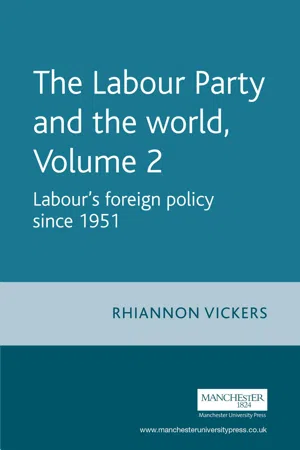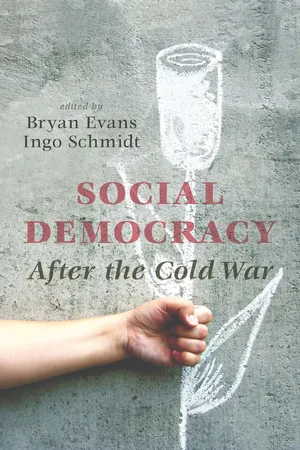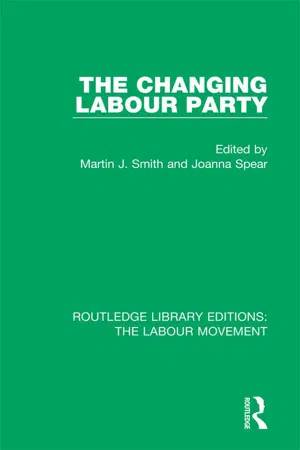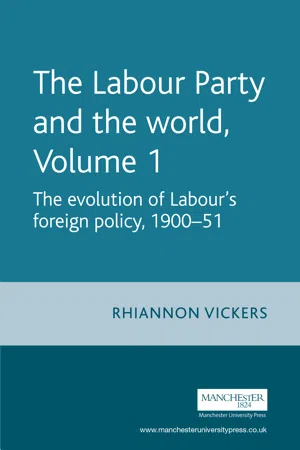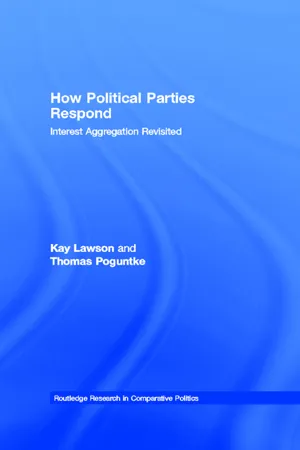Politics & International Relations
Labour Party
The Labour Party is a center-left political party in the United Kingdom, advocating for social justice, workers' rights, and progressive policies. It was founded in 1900 and has been a major force in British politics, forming governments and advocating for policies such as nationalization of key industries, social welfare programs, and public healthcare.
Written by Perlego with AI-assistance
Related key terms
5 Key excerpts on "Labour Party"
- eBook - ePub
The Labour Party and the world, volume 2
Labour's foreign policy since 1951
- Rhiannon Vickers(Author)
- 2013(Publication Date)
- Manchester University Press(Publisher)
12 The Labour Party, however, has historically found this conception of foreign policy problematic, wanting to go beyond it with a call for foreign policy to be based upon moral purpose. This has been for two main reasons.First, the Labour Party has tended to encompass a wider spectrum of political opinions than the Conservative Party, and, with its emphasis on party democracy, has given greater importance to its extra-parliamentary institutions of policy-making. This has acted as a constraint on the party leadership. As outlined in Volume 1 of this study, given the Labour Party’s ideological and representational beginnings, and, particularly in its early years, the belief that the principles guiding domestic policy could be projected on to the international arena, different factions within the party have pulled foreign policy in different directions. There were five main influences on the early Labour Party. These were the trade union movement; the Independent Labour Party; the Social Democratic Federation, a British Marxist group; the Fabian Society; and radical Liberals, epitomised by the members of the Union of Democratic Control. Each of these groups had its own particular influence over the way that foreign policy and international affairs were thought about. Each had their own particular analytical framework for understanding relations between states, and each their own way of responding to concrete situations. These different influences provided a rich source for ideas on international politics, but also produced impulses towards Labour’s appropriate response to particular foreign policy issues which were sometimes antithetical to each other. This has added to the problems of developing a typology of the British Labour Party’s foreign policy, while also explaining in part the depth of the some of the intra-party conflict on international affairs.For believers in class struggle, the Labour Party’s role was to protect working-class interests, internationally as well as nationally, and to promote international working-class solidarity and socialist internationalism. The radical Liberals contributed greatly to Labour’s liberal internationalism, including the belief in self-determination, international justice, and in the workings of international organisations such as the League of Nations and the UN. For the ethical socialists and Nonconformists, pacifism and anti-militarism were important components of their worldview. The Independent Labour Party and the radical Liberals reinforced each other in their belief that militarism and secret diplomacy were the causes of war. Some of the radical Liberals influenced the Marxist perspective on the economic basis of inter-capitalist rivalry. These different contributing streams to Labour’s foreign policy often pulled in opposing directions, as evinced by the split over how to respond to the outbreak of the First World War in 1914, or debates over rearmament in the early 1930s.13 - eBook - ePub
- Bryan Evans, Ingo Schmidt(Authors)
- 2012(Publication Date)
- AU Press(Publisher)
THE BRITISHLabour Party In Search of Identity BetweenLabour and Parliament BYRON SHELDRICKThe British Labour Party has always held a unique place in the history of social democracy. As the birthplace of the Industrial Revolution, Britain can claim to have witnessed the emergence of the working class. The fact that Marx and Engels did much of their writing in England and based many of their observations on the conditions of the working class in its great industrial cities makes the history and trajectory of working-class politics and, by extension, the Labour Party, particularly significant. The Labour Party itself, however, has a history that, for many, is at best mixed. It has had high hopes yet has frequently failed to deliver (Coates 1996). The party has struggled to establish its identity: Is it a working-class party, a socialist party, or a party for all people? It has struggled to balance the conflicting demands of maintaining both electoral viability and a deep connection to its broader core constituencies.The inability to resolve these issues of identity has left the party particularly ill-suited to resolve the fundamental and deep contradictions of capitalism in Britain. As a result, despite relative electoral success in recent years, the party continues to be unable to provide a convincing response to economic crisis. Instead, it has retreated to a narrow electoralism based on an understanding of class not as a fundamental organizing principle of society but as a demographic construct for orienting electoral appeals. In part, this tendency reflects the historical origins of the Labour Party and the limits inherent to its structure. Rooted in the twin elements of labourism, on the one hand, and parliamentarianism, on the other, the party has never been able to develop a critical understanding of capitalism or of the limits and contradictions of the British economy. As a result, it has largely understood attempts to embed itself in the working class and to engage in an exercise of collective identity formation as fundamentally irreconcilable with electoral victory. - eBook - ePub
- Martin J. Smith, Joanna Spear(Authors)
- 2018(Publication Date)
- Routledge(Publisher)
These international organizations are increasingly being viewed as the mechanisms for coping with such problems, and in this sense the international system is increasingly coming to parallel the Labour Party’s foreign policy agenda. Congruence between the two has never been greater. Another aspect of the issue is that the majority of foreign policy is reactive, that is, responding to events in the international system, rather than initiating policies. This means that the party in government could only hope to have general principles as a framework for responding to events, and maybe initiate policy change on one or two issues. This is particularly true given the increased emphasis on multilateral diplomacy, which leaves even less room for national initiatives. Nevertheless many questions over Labour Party policy remain, particularly over how to achieve the changes it envisages. These are issues currently also being discussed internationally. Questions under discussion include ‘How is the United Nations to be strengthened?’ (Kaufman, 1991) and ‘How will other international organizations function in new roles, for example, NATO as a political structure?’ (The Guardian, 27 August 1991). Labour has, as yet, given little indication of its response to these and other questions about making multilateral diplomacy work, but research on these questions is currently in progress. Importantly, the Labour Party is no longer alone within Britain in strongly advocating multilateral diplomacy, placing emphasis on development, environmental aid, and linking aid to human rights (see Labour Party 1991c and 1991d; The Guardian, 19 August 1991). The post-Thatcher Conservative Party is increasingly expressing faith in international organizations as a means of problem solving – a radical departure from the Thatcher years (Mayall 1990: 86) - eBook - ePub
- Rhiannon Vickers(Author)
- 2013(Publication Date)
- Manchester University Press(Publisher)
The main political influences on the development of the Labour Party’s attitudes towards international affairsThe Labour Party was born out of domestic political discontent, and its policies – to a greater extent forged in opposition up until the 1940s – tended to reflect this. Because of these two factors, Labour’s foreign policy reflected the party itself, the beliefs and standpoints of the various groups that came together to create it, and the dynamics between them, rather than necessarily the external world and experience and appraisal of international affairs. This issue will form a recurring theme throughout the next two chapters, which chart the early the years of Labour foreign policy, showing how Labour’s foreign policy. It is worth briefly considering the main influences on, and groupings within, the Labour Party. This will, by necessity, be something of a cursory sketch, and it is worth remembering that conflicts over ideology and policy occurred within the different groupings almost as much as between them. Jupp points out that until 1918 the Labour Party was more of a movement than a party, ‘in the sense of having little central discipline and being bound together by an agreement to accept all ideological positions critical of existing society and postulated on social change through political action. It had not orthodoxy, unlike the European social-democratic parties.’1The main groupings within the Labour Party and their influence on Labour’s world-view
As noted in the last chapter, when the LRC was set up in 1900 there were four main progenitors, each bringing their own influences on domestic and foreign policy: in no particular order of importance, the trade union movement, the ILP, the Fabian Society, and the SDF and various Marxist groups. In addition to these, a fifth grouping had a remarkable degree of influence over Labour’s developing foreign policy, and this was composed of radical Liberals, epitomised by the members of the UDC. Each of these groups had its own particular influence over the way that foreign policy and international affairs were thought about. Each had their own particular analytical framework for understanding relations between states, and each their own way of responding to concrete situations. These different influences provided a rich source for ideas on international politics, but also produced impulses towards Labour’s appropriate response to particular foreign policy issues that were sometimes antithetical to each other. This has added to the problems of developing a typology of the British Labour Party’s foreign policy, while also explaining in part the depth of the some of the intra-party conflict on international affairs. - eBook - ePub
- Kay Lawson, Thomas Poguntke(Authors)
- 2004(Publication Date)
- Routledge(Publisher)
Even this brief discussion makes it clear that nationalization was both more and less than a policy and that the debate over it was about much more. Other issues were likewise embedded in broader frameworks of argument, rhetoric and policy formulation. Rather than focus on a particular issue, which becomes more or less salient at various moments and takes on different meanings in different contexts, it seems more useful to ask, more broadly, what Labour’s history reveals about its central assumptions, attitudes and behaviour.What ‘Old’ Labour stood forAlthough scholars, journalists and politicians themselves spend considerable time and energy analysing party programmes and beliefs, perhaps the central conclusion to emerge from their investigations is that neither ideology nor programme has been of primary importance in defining the Labour Party as a social movement, as a mechanism for articulating interests, as a machine for mobilizing votes, or as an agency for rule (Brivati and Heffernan 2000; Brooke 1997; Tanner et al. 2000). The party is something much more and much less than a collection of ideas and principles. It is first and foremost the projection into politics of an extremely intense working-class identity, an identity rooted in particular communities and industries, reflected in ways of speaking and acting and dressing and relaxing, and registered more visibly by membership in associations with a distinctly working-class flavour and in formal attachments to the trade unions (Cronin 1984; Hall 1999). This identity is essentially pre-political, but for a variety of reasons came over the course of the twentieth century to be translated into support for, and occasionally participation in, the Labour Party.Just how this link between class identity and Labour politics was formed, and what it meant, has been the subject of much research and debate. To scholars for whom the harsh and stubborn realities of class are a given and for whom the central question is how best to bring about socialism, the puzzle is to ascertain why Labour should have been the chosen vehicle for working-class representation and why the party’s uniquely fuzzy understanding of class, and of politics more generally, should have generated such loyalty. To those for whom the realities of class are less obvious and less insistent, the question is why working people should have been so attracted to class rhetoric and the identities it implied. For present purposes, both of these questions can be put aside and replaced with a more pragmatic inquiry about the consequences of this unusually close connection between class and party.
Learn about this page
Index pages curate the most relevant extracts from our library of academic textbooks. They’ve been created using an in-house natural language model (NLM), each adding context and meaning to key research topics.
